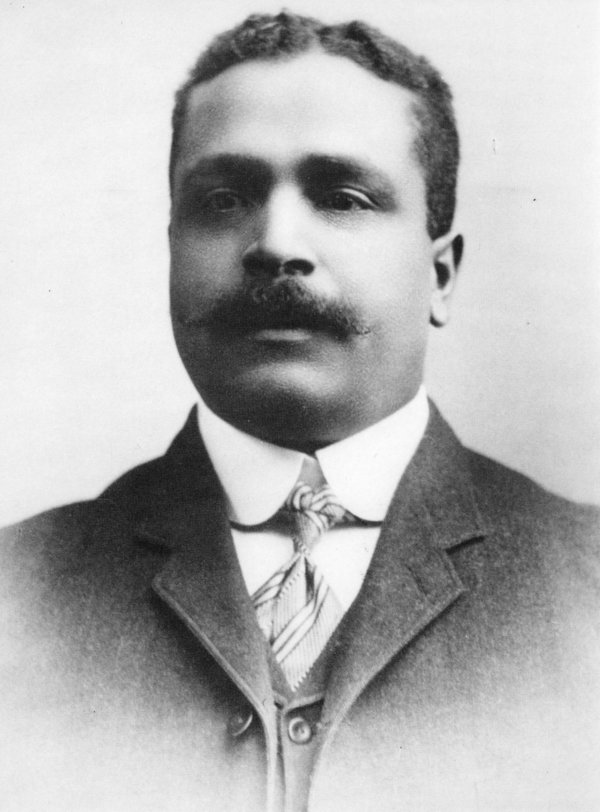
Source: Link
SHADD, ALFRED SCHMITZ, educator, doctor, journalist, farmer, politician, and office holder; b. 1870 in Raleigh Township, Ont., son of Garrison Shadd and Harriet Poindexter; m. Jeanette Simpson in Melfort, Sask., and they had a daughter and a son; d. 9 March 1915 in Winnipeg.
Both Alfred Shadd’s grandfather Abraham Doras Shadd and his aunt Mary Ann Camberton Cary [Shadd*] had been prominent activists in Ontario’s black community. Trained initially in Toronto as a teacher, he taught for at least a year at the same racially segregated school in Chatham in which he had been educated. Later he began medical studies at the University of Toronto, but, running short of money, he withdrew in 1896 and took up a post as teacher at Kinistino, in the future province of Saskatchewan.
After a year in Kinistino, Shadd returned to the University of Toronto to complete his medical studies, graduating with honours in 1898. He then made his way back to the west, this time as a doctor. From his base in Kinistino, Shadd quickly gained a reputation as a dedicated and tireless physician, travelling incessantly to tend patients scattered throughout the Carrot River valley. In 1904 he moved his practice to nearby Melfort, where, for a time, he also operated a pharmacy. Three years later he went to Europe with the intention of pursuing postgraduate studies in Edinburgh and Paris, but a lack of funds soon forced him to abandon these plans and resume his medical practice in Melfort.
Over the next decade Shadd became involved in a wide range of activities. He was one of Saskatchewan’s first coroners, he was instrumental in the building of a small hospital in Melfort in 1906, and he sat both on the Melfort town council and on the school board. An amateur but enthusiastic farmer, he founded the Melfort Agricultural Society and served as its first president; he also helped establish the local farmers’ elevator company. Socially prominent, he was a warden at All Saints Anglican Church and belonged to the local masonic lodge, the Orange order (he dubbed himself a “black Orangeman”), and the Independent Order of Foresters. He and his wife (who, incidentally, was white) frequently received distinguished visitors in their home, including the former premier of the North-West Territories, Frederick William Gordon Haultain*.
Politically, Shadd, like other members of his family, was a lifelong Conservative. In 1902 he ran unsuccessfully in Kinistino as a candidate for the territorial assembly, and three years later he sought election to Saskatchewan’s first legislature under the banner of Haultain’s Provincial Rights party. His campaign in 1905 was widely admired, the local newspaper describing him as a “fluent and forceful speaker” able to “rouse his audience to the wildest pitch of enthusiasm.” He used his “large and penetrating speaking voice” to criticize Liberal leader Thomas Walter Scott* and to call for a stronger provincial government, construction of a railway to Hudson Bay, and the imposition of taxes on the Canadian Pacific Railway. In the end, Shadd was defeated in the 1905 election, but by only 52 votes. Subsequently, he continued to fight for his political principles in the pages of the Carrot River Journal, a newspaper of which he was co-owner and co-editor from 1908 to 1912. Towards the end of his life, he fervently supported Canadian participation in World War I, frequently delivering “inspirational words” at meetings of the Red Cross Society.
Shadd had a strong, and colourful, personality. As the owner of a 1906 automobile – one of the first in the district – he drove like a man possessed, frequently crashing through farmers’ fences as he made his medical rounds; in his defence, he said that his car “saved more people than it killed.” He was much loved in Melfort and throughout the valley, both as a doctor and as a human being. After his sudden death from appendicitis at the age of 45, the Melfort Moon said that “no drive was too long; no night too dark; no trail too rough to deter the doctor when the call for assistance came.” According to another newspaper account, he was “universally liked by all who knew him, especially those who received medical treatment from him, it being as good as medicine to hear his hearty laughter when he was cheering up a patient.”
Carrot River Journal (Melfort, Sask.), 1908–12. Journal (Melfort), 1915. Moon (Melfort), 1904–15. [J. W.] G. MacEwan, Fifty mighty men (special ed., Saskatoon, 1958). Timothy Ryan, “Medicine in Melfort,” in Voices of the past: a history of Melfort and district (Melfort, 1955), 45–51. C. A. Thomson, “Doc Shadd,” Sask. Hist., 30 (1977): 41–55; “A man who stood erect,” Umoja (Boulder, Colo.), new ser., 3 (1979), no.1 : 19–41; “Saskatchewan’s black pioneer doctor,” Canadian Family Physician (Toronto), 23 (1977), no.11: 53–62; “Saskatchewan’s great pioneer black doctor,” Canadian Medical Assoc., Journal (Toronto), 116 (January–June 1977): 1317–19. R. W. Winks, The blacks in Canada: a history (Montreal, 1971).
Colin Argyle Thomson, “SHADD, ALFRED SCHMITZ,” in Dictionary of Canadian Biography, vol. 14, University of Toronto/Université Laval, 2003–, accessed November 28, 2024, http://www.biographi.ca/en/bio/shadd_alfred_schmitz_14E.html.
The citation above shows the format for footnotes and endnotes according to the Chicago manual of style (16th edition). Information to be used in other citation formats:
| Permalink: | http://www.biographi.ca/en/bio/shadd_alfred_schmitz_14E.html |
| Author of Article: | Colin Argyle Thomson |
| Title of Article: | SHADD, ALFRED SCHMITZ |
| Publication Name: | Dictionary of Canadian Biography, vol. 14 |
| Publisher: | University of Toronto/Université Laval |
| Year of publication: | 1998 |
| Year of revision: | 1998 |
| Access Date: | November 28, 2024 |